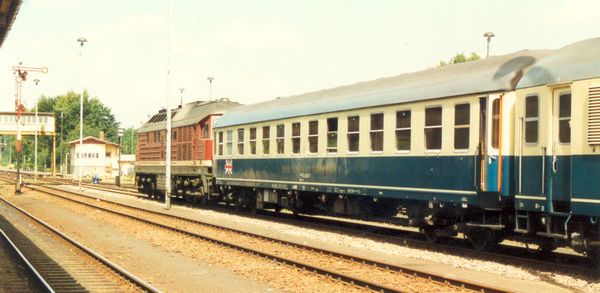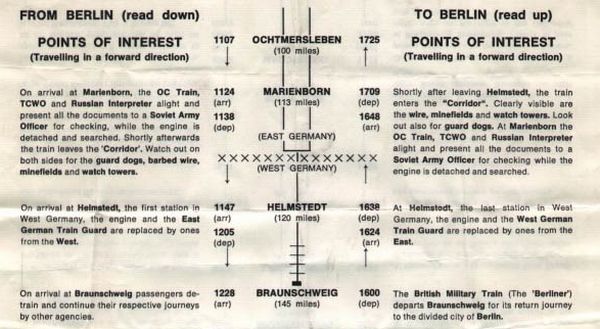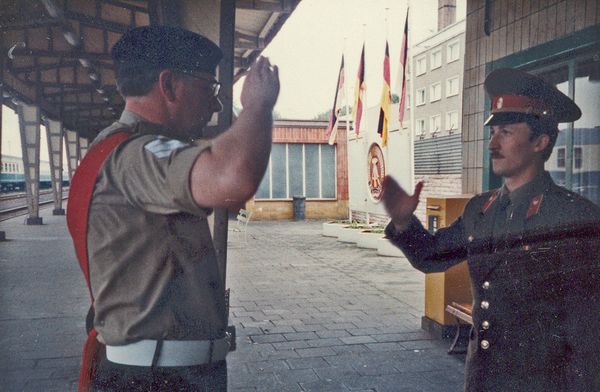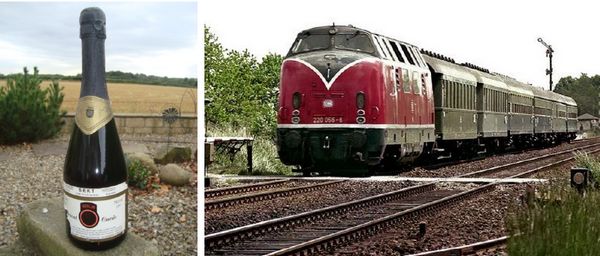How the Allies Travelled to Berlin by Rail
Beginning in July 1945, in order to exercise the Allied right to access West Germany from West Berlin by train, a military train (The Berliner) ran a daily return service from Charlottenburg (West Berlin) to Braunschweig (West Germany).
Although the carriages were British, the locomotive used for transit through the DDR was East German.

The East German locomotive pulling the British military carriages
After leaving Charlottenburg station 'The Berliner' stopped in Potsdam and an East German Train Guard joined the train.

The route of the military train....Berlin - Braunschweig - Berlin



The first and last sections of the guide that was issued to passengers detailing what they would see and experience on their journey
Although passengers were encouraged to look out for certain landmarks, it was made clear that cameras and binoculars were not to be used
The journey would take about 4 hours to cover the distance of 145 miles (232km).
Once the military train crossed into East German territory, the doors were locked. Armed British soldiers were on board as well as a Russian speaking NCO.
The train stopped at Marienborn (see the map - an East German station) and, at this point, the British officer in charge of the train, the imposingly titled Train Conducting Warrant Officer (TCWO) and the Russian interpreter met a Soviet officer who checked the train's documentation.
The East German locomotive was separated and searched before being reconnected.


The two images show the British team on the platform in Marienborn and the NCO interpreter conversing with the Soviet officer
After the halt in Marienborn, the train left DDR territory and stopped at the first West German station - Helmstedt.
Here the DDR locomotive and the East German Train Guard were replaced by a West German locomotive and Train Guard.
The train then continued to Braunschweig where the carriages were cleaned and prepared for the return journey.
Note: Only highly trusted loyal DDR party members would be allowed to participate in the operation of the train as they had to wait in Helmstedt until 'The Berliner' returned for the journey back to Berlin.

The military 'check in' building (RTO- Railway Transport Officer) and 'The Berliner' waiting in Braunschweig station
Life onboard the train was deliberately ostentatious with 'Wagons-Lits' providing the catering.
On the journey back from Braunschweig, formal dinner with wine was rounded off with "Potsdam port" - served as the train reached Potsdam just outside Berlin.
The last drop was traditionally downed as the train pulled into Charlottenburg station.

On the morning train out of Berlin a full English breakfast would be served. In the evening a typical menu would be soup, beef tenderloin, dessert, cheese and port.
All this would be served with a number of good wines.
There was something of a party atmosphere on the train for the passengers to enjoy.

The semi-formal images of the train crew at work belie the sometimes 'riotous' behaviour!
One officer in charge of the train remembers his time very fondly..........
I was OC Train on a number of occasions in the late 80s. Great fun. At Marienborn the OC, TCWO and a military interpreter marched along the platform and halted infront of the Russian Officer and then went into a small office where all the travel docs were inspected and stamped. As the train was returning to Berlin that afternoon the Russians would sometimes ask you to buy bits and pieces for them in Braunschweig (porn, Bosch spark plugs for their Lada etc). The return was often very liquid with the Russians producing undrinkable vodka for toasts. Once, just after New Year, I gave them a bottle of Grouse which they insisted on sharing and finishing before the train was allowed to leave. This meant that there were a few trains behind us which were held up much to the Russians' amusement.
I also remember the tradition of "Potsdam Port" where the OC, TCWO and Interpreter had to see how much port could be consumed between Potsdam and Charlottenburg on the return journey. Thank God the MT (military transport) always collected me at the end of the day - it normally took a day or so to recover!

My souvenir of 'The Berliner' - a bottle of own label sekt (sparking wine)
The final journey of the British Military Train was on the 7th February 1991.
A short video which provides an excellent summary of the Military Train.